Skulls Unlimited processes thousands of skulls yearly for hunters, professionals, and educators.
Learn more!

Apr 2, 2007
Reuters Life!
NEW YORK (Reuters Life!) - When most people think of a family business a butcher store, flower shop or restaurant comes to mind. But Jay Villemarette's company is not your normal neighborhood firm.
He owns and operates Skulls Unlimited International, a company that cleans, sells and stores skulls. Business is so busy he can hardly keep up with demand.
"We get deliveries from UPS and FedEx everyday that consist of anything from bears to deer to cougars to buffalo to dogs and cats. You name it, it comes in," said Villemarette, owner and founder of the Oklahoma City firm.
"We have a big freezer. We get a lot of stuff coming through the doors and some of it just has to be put on the back burner," he said in an interview.
The 14 people who work for the company process about 2,000 skulls a month in a facility that includes cleaning and storage areas, offices and a Museum of Osteology.
Most of the skulls come from hunters, taxidermists, zoos and museums. They are cleaned, assembled and stored or sold.
The collection includes all kinds of animal bones ranging from giraffes and gorillas to whales.
"One day last week we had three kangaroos come in," Villemarette said.
"A month ago we had three gorillas come in, from different places, in the same day. It's pretty amazing what comes through our doors here."
Villemarette has loved skulls since he found a dog skull as a seven-year-old boy in the woods near his home. He collected skulls through his teens and cleaned and sold them as a part-time hobby after high school, when he worked as an auto body technician.
When he was out of work with a young family to feed he decided to turn his hobby into a business.
"It was very, very hard. A lot of people have said that I've created a market where a market didn't exist. To some degree that's true but the market existed, just nobody capitalized on it."
The company has grown from a one-man operation into a full-time, fully staffed facility, which includes two of Villemarette's sons, a niece and nephew.
"We are family-owned and operated, but I don't give anyone a free ride," he said.
Staff unpack, sort and begin work on the many specimens that are donated to the facility each day. About 10 to 50 of the skulls each month are put into the museum, which is slated to open to the public later this year.
Depending on the animal and how it arrives, the deliveries might need to be macerated or soaked, until the flesh easily falls away.
Any remaining tissue on the bones is completely eaten by dermestid beetles. Although it is one of the messiest, dirtiest and smelliest jobs that anyone could do, Villemarette said the market was ready for it when he started his company.
"Schools have always had a need for skulls," he said.
"Matter of fact, there are biological supply companies that have been in business for over 100 years and they've been selling skulls. But they've never sold skulls the way we have."
He added that most biological supply companies provide skulls of dogs, cats and other animals, but what they have to offer may not be as extensive as his company's collection.
Despite his unusual job, Villemarette said he has a normal family life, with a wife and kids at home. He spends his spare time like most other working people.
"Generally my evenings are pretty much like the rest of the world," he said. "You come home, take a shower, relax, watch some TV, get ready for bed and start it all over again tomorrow."

Leave a comment